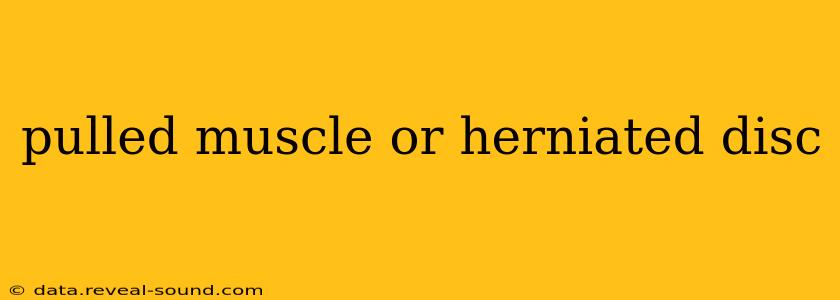Experiencing lower back pain? Distinguishing between a pulled muscle and a herniated disc can be tricky, as both present similar symptoms. This comprehensive guide will help you understand the key differences, allowing you to seek appropriate treatment. We'll explore the causes, symptoms, diagnosis, and treatment options for each condition, answering common questions along the way.
What is a Pulled Muscle (Muscle Strain)?
A pulled muscle, or muscle strain, occurs when muscle fibers are overstretched or torn. This is often caused by sudden movements, overuse, or inadequate warm-up before physical activity. The severity of a pulled muscle can range from mild discomfort to severe pain and limited mobility. Lower back muscle strains are particularly common due to the constant stress and strain placed on the muscles in this area.
What is a Herniated Disc?
A herniated disc, also known as a slipped or ruptured disc, happens when the soft, gel-like center of an intervertebral disc pushes through a tear in the tougher outer layer. These discs act as cushions between the vertebrae in your spine. A herniation can irritate nearby nerves, causing pain, numbness, and weakness that can radiate down the leg (sciatica). This condition is more serious than a simple muscle strain.
What are the Symptoms of a Pulled Muscle?
Symptoms of a pulled muscle in the lower back typically include:
- Localized pain: The pain is generally concentrated in the affected muscle.
- Muscle spasms: Tightness and involuntary muscle contractions may occur.
- Stiffness: Movement can be restricted and painful.
- Swelling: Mild swelling may be present.
- Tenderness to the touch: The affected area is sensitive to pressure.
What are the Symptoms of a Herniated Disc?
Symptoms of a herniated disc can be more severe and varied than those of a pulled muscle. These include:
- Sharp, shooting pain: The pain can be intense and radiate down the leg (sciatica).
- Numbness or tingling: This is a common symptom, often affecting the leg or foot.
- Weakness: Muscle weakness in the leg or foot can occur.
- Limited range of motion: Significant stiffness and difficulty bending or twisting may be experienced.
- Pain that worsens with certain movements: Coughing, sneezing, or bending can exacerbate the pain.
How is a Pulled Muscle Diagnosed?
Diagnosing a pulled muscle usually involves a physical examination. Your doctor will assess your symptoms, examine your range of motion, and palpate the affected area. Imaging tests like X-rays are typically not necessary for diagnosing a simple muscle strain.
How is a Herniated Disc Diagnosed?
Diagnosing a herniated disc may involve a more thorough evaluation. Your doctor will conduct a physical exam, assess your neurological function, and may order imaging tests such as:
- Magnetic Resonance Imaging (MRI): This provides detailed images of the spine and can clearly show a herniated disc.
- Computed Tomography (CT) scan: This can also visualize the spine, though it's not as detailed as an MRI.
- X-rays: While not as effective at visualizing soft tissues, X-rays can help rule out other conditions such as fractures.
How are Pulled Muscles Treated?
Treatment for a pulled muscle typically focuses on rest, ice, compression, and elevation (RICE). Over-the-counter pain relievers, such as ibuprofen or naproxen, can help manage pain and inflammation. Physical therapy may be recommended to improve flexibility and strengthen the affected muscles.
How are Herniated Discs Treated?
Treatment for a herniated disc depends on the severity of the symptoms. Options may include:
- Conservative management: This often involves rest, ice, pain relievers, physical therapy, and possibly epidural steroid injections.
- Surgery: Surgery may be considered in cases of severe pain, neurological deficits, or if conservative treatment fails.
What are the potential long-term effects of a pulled muscle?
If not properly treated, a severe muscle strain can lead to chronic pain, muscle weakness, and decreased mobility. Early intervention and proper rehabilitation are crucial to prevent long-term complications.
What are the potential long-term effects of a herniated disc?
Untreated herniated discs can cause persistent pain, nerve damage, and potentially lead to disability. Early diagnosis and appropriate treatment are vital in minimizing long-term consequences.
Can a pulled muscle turn into a herniated disc?
A pulled muscle itself cannot directly turn into a herniated disc. However, repetitive strain or improper healing from a muscle strain might contribute to the degeneration of the intervertebral discs over time, increasing the risk of a herniated disc later on.
This information is for general knowledge and does not constitute medical advice. Always consult with a healthcare professional for diagnosis and treatment of any medical condition.
